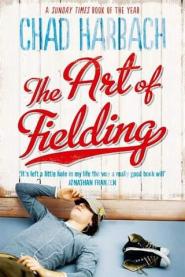
Chad Harbach
First Sentence: Schwartz didn’t notice the kid during the game.
Back of the book:
At Westish College, baseball star Henry Skrimshander seems destined for the big leagues until a routine throw goes disastrously off course. His error will upend the fates of five people.
Henry’s fight against self-doubt threatens to ruin his future. College president Guert Affenlight has fallen unexpectedly and helplessly in love. Owen Dunne becomes caught up in a dangerous affair. Mike Schwartz realizes he has guided Henry’s career at the expense of his own. And Pella Affenlight returns to Westish after escaping an ill-fated marriage, determined to start a new life.
As the season counts down to its climactic final game, all five are forced to confront their deepest hopes, anxieties and secrets.
Quotes from the book:
[…] but even as the pages accumulated, despair set in. It was easy enough to write a sentence, but if you were going to create a work of art, the way Melville had, each sentence needed to fit perfectly with the one that preceded it, and the unwritten one that would follow. And each of those needed to square with the ones on either side, so that three became five and five became seven, seven became nine, and whichever sentence he was writing became the slender fulcrum on which the whole precarious edifice depended. That sentence could contain anything, anything, and so it promised the kind of absolute freedom that, to Affenlight’s mind, belonged to the artist and the artist alone. And yet that sentence was also beholden to the book’s very first one, and its last unwritten one, and every sentence in between. Every phrase, every word, exhausted him.
“The Human Condition being, basically, that we’re alive and have access to beauty, can even erratically create it, but will someday be dead and will not.”
A tear ran down her cheek, pushed forward by the one behind it, and the one behind that, and who knew how many more.
“The dew twinkled in the buttery Florida sunlight.”
Talking was like throwing a baseball. You couldn’t plan it out beforehand. You just had to let go and see what happened. You had to throw out words without knowing whether anyone would catch them – you had to throw out words you knew no one would catch. You had to send your words out where they weren’t yours anymore. It felt better to talk with a ball in your hand, it felt better to let the ball do the talking. But the world, the nonbaseball world, the world of love and sex and jobs and friends, was made of words.
* * * *
Click for last sentence




